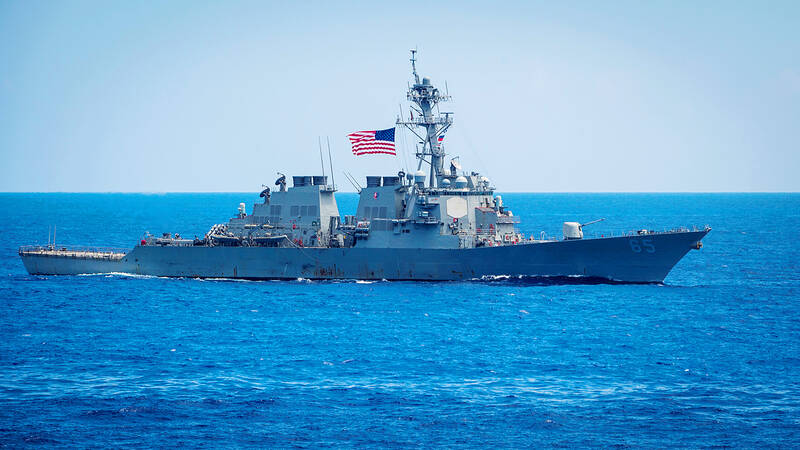The Philippines would let the US use its military bases in the event of a conflict in the Taiwan Strait, as long as it is “important” to the nation’s “own security,” Nikkei Asia reported yesterday.
In a recent interview with the Japanese news magazine, Philippine Ambassador to the US Jose Manuel Romualdez also urged restraint, saying that “nobody wants to have any kind of war or confrontation.”
“We want to ask both countries to lessen the tension by having more dialogue and then trying to resolve all of these issues, because it’s in our part of the world,” said Romualdez, a relative of Philippine President Ferdinand Marcos Jr.

Photo: Reuters / US Navy
Former Philippine president Rodrigo Duterte had floated the idea of letting the US use his nation as a staging ground during a Taiwan conflict, but there has been little sign of formal talks on the issue, Romualdez told Nikkei.
Manila and Washington are also in talks to increase the number of bases US forces can use, he added.
Under the 2014 Enhanced Defense Cooperation Agreement (EDCA) between the two nations, the US can maintain a rotating military presence at five Philippine bases.
“Our military and the military of the United States are all looking into what are the possible areas,” Romualdez said, adding that it might include a naval base.
A Pentagon spokesperson told the magazine that the two sides “hold regular discussions on deepening our enduring security alliance.”
“Looking ahead, we seek to enhance the posture of our alliance to address new and emerging challenges,” the spokesperson said. “We intend to continue to implement infrastructure projects at current EDCA locations and explore additional sites for further development.”
When China staged military drills around Taiwan following US House of Representatives Speaker Nancy Pelosi’s visit on Aug. 2 and 3, one of the zones it used extended into the Philippines’ exclusive economic zone, according to the US think tank Center for Strategic and International Studies.

NATIONAL SECURITY THREAT: An official said that Guan Guan’s comments had gone beyond the threshold of free speech, as she advocated for the destruction of the ROC China-born media influencer Guan Guan’s (關關) residency permit has been revoked for repeatedly posting pro-China content that threatens national security, the National Immigration Agency said yesterday. Guan Guan has said many controversial things in her videos posted to Douyin (抖音), including “the red flag will soon be painted all over Taiwan” and “Taiwan is an inseparable part of China,” while expressing hope for expedited “reunification.” The agency received multiple reports alleging that Guan Guan had advocated for armed reunification last year. After investigating, the agency last month issued a notice requiring her to appear and account for her actions. Guan Guan appeared as required,

Japan and the Philippines yesterday signed a defense pact that would allow the tax-free provision of ammunition, fuel, food and other necessities when their forces stage joint training to boost deterrence against China’s growing aggression in the region and to bolster their preparation for natural disasters. Japan has faced increasing political, trade and security tensions with China, which was angered by Japanese Prime Minister Sanae Takaichi’s remark that a Chinese attack on Taiwan would be a survival-threatening situation for Japan, triggering a military response. Japan and the Philippines have also had separate territorial conflicts with Beijing in the East and South China

A strong cold air mass is expected to arrive tonight, bringing a change in weather and a drop in temperature, the Central Weather Administration (CWA) said. The coldest time would be early on Thursday morning, with temperatures in some areas dipping as low as 8°C, it said. Daytime highs yesterday were 22°C to 24°C in northern and eastern Taiwan, and about 25°C to 28°C in the central and southern regions, it said. However, nighttime lows would dip to about 15°C to 16°C in central and northern Taiwan as well as the northeast, and 17°C to 19°C elsewhere, it said. Tropical Storm Nokaen, currently

PAPERS, PLEASE: The gang exploited the high value of the passports, selling them at inflated prices to Chinese buyers, who would treat them as ‘invisibility cloaks’ The Yilan District Court has handed four members of a syndicate prison terms ranging from one year and two months to two years and two months for their involvement in a scheme to purchase Taiwanese passports and resell them abroad at a massive markup. A Chinese human smuggling syndicate purchased Taiwanese passports through local criminal networks, exploiting the passports’ visa-free travel privileges to turn a profit of more than 20 times the original price, the court said. Such criminal organizations enable people to impersonate Taiwanese when entering and exiting Taiwan and other countries, undermining social order and the credibility of the nation’s